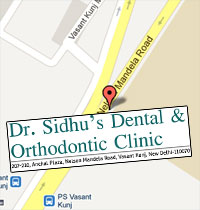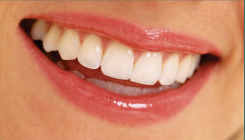
Dental Implants
As we age, some of us will lose teeth due to disease, injury, or simple daily wear. In addition to bringing about unwanted changes to a person's facial appearance, missing teeth have a negative effect on that person’s confidence and self-esteem. With the advent of implant dentistry, however, those who are missing one, two or several teeth no longer have to accept a lifetime of embarrassment and inconvenience. Dental implants, that are anchored directly into the jawbone and topped with realistic replacement teeth, provide the security and usability of permanently placed teeth.What are Dental Implants?
Dental implants are a restorative dentistry option that allows patients to replace missing teeth with ones that look, feel, and perform like their own. During the first step of this procedure, a doctor skilled in implant dentistry surgically places a titanium screw or post in the patient's jaw. After the gums have healed around the embedded post, a replacement tooth is attached to the top of it.
Dental implants are metal posts that are surgically placed in the bone under your gums. During a healing period, the bone grows around the implant. Then a replacement tooth, or crown, is attached to the metal post, giving you a restoration that is a lot like your natural tooth. Implants also can be used to secure bridges and dentures when more than one tooth is missing.
PARTS OF DENTAL IMPLANTS
- Crown
- Abutment
- Implant or fixture
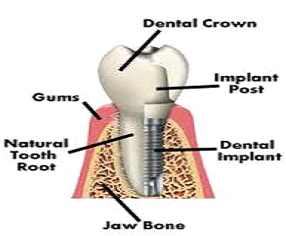
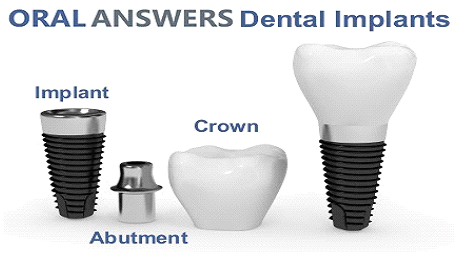
CROWN
- The part of a tooth projecting from the gum.
- An artificial replacement or covering for this.
- Crowns are the top part of a restoration and are the part that we see in the mouth.
- They replicate the original teeth to provide a biting surface and aesthetic appearance. They are hand made by technician.
- The supporting substructure for the crown may be hand made or machined (onsite or offsite). The completed crown is either cemented or screwed onto an abutment
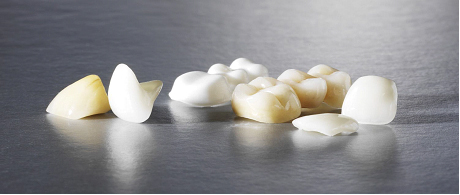
ABUTMENT
An abutment provides support for the crown (or several crowns i.e. a bridge). It is also the interface between the crown and the implant.
IMPLANT
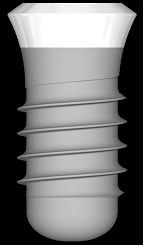 An implant provides the anchor or foundation for a restoration. It is screwed into the bone of the jaw providing a fixed platform on which an abutment can be screwed.
Bone tissue can grow around the implant regenerating and strengthening thejaw reducing the bone loss which occurs when natural teeth are lost.
An implant provides the anchor or foundation for a restoration. It is screwed into the bone of the jaw providing a fixed platform on which an abutment can be screwed.
Bone tissue can grow around the implant regenerating and strengthening thejaw reducing the bone loss which occurs when natural teeth are lost.
Advantages of dental Implants
The implants fuse to the jawbone and offer a secure base for the replacement teeth, some patients find this a comfortable option in restoring their smile. In many cases, implant-supported teeth may look and feel more like natural teeth.
Can anyone have Implants?
Healthy gums and bone are necessary to support dental implants. Patients who want to have implants must commit to a meticulous oral hygiene routine, including flossing, brushing and regular dental visits to help protect the supporting tissues from any disease.
Because dental implant placement is a surgical procedure, candidates must be in good overall health. Successful fusion of the bone to the implant requires good periodontal health, so people at higher risk of experiencing gum disease—such as those with diabetes or those who smoke—might not be good candidates.
Dental Specialist places Implants
Implant placement is not a dental specialty. Often, a team of dentists—general dentists or specialists—will work together to provide different parts of the treatment. One dentist may perform the surgery to place the implant that goes into the bone. Another dentist may place the crown on top of the implant to complete the restoration. Some dentists are trained to perform all aspects of the treatment themselves.
Either way, it’s important that all members of the dental team work together for the best possible results, in consultation with you, the patient.
Indication of dental implants
- Missing teeth due to any reason.
- Painful & loose dentures.
- Prevention of shrinkage of jawbone after tooth loss.

Dental Implants – Benefits and Possible Complications
Dental implants are a vast improvement over conventional dentures. They're more stable and user-friendly than many other teeth replacement options, and because the posts that secure dental implants in place are integrated into the jaw, they also help prevent bone loss and gum recession (because the pressure of chewing on the implant’s crown stimulates the underlying bone and prevents it from deteriorating from disuse). However, some medical circumstances – including radiation therapy in the mouth area, and diseases such as diabetes -- lower the success rate for implant dentistry. For that reason, patients must undergo a rigorous screening process before they may proceed with implant dentistry.
Alternatives for Replacing Missing Teeth
Patients can choose from a variety of options to replace missing teeth. In addition to dental implants, there are removable partial dentures held in place by wire clips; fixed dental bridges cemented into position by crowns placed on the teeth adjacent to an empty space; and traditional full dentures
Cost of Dental Implants
The cost of dental implants varies depending on the number of missing teeth and the area of the country in which the implant dentistry is performed. The cost of dental implants ranges from $2,000 to $4,000, so the average cost of the procedure is hard to pinpoint. Prior to treatment, your dental professional can go over implant prices and discuss your payment options with you. Fortunately, financing is available for people who require advanced treatment such as dental implant placement. The clinic offers high quality implants ranging from Rs40000/- to Rs 50000/-










